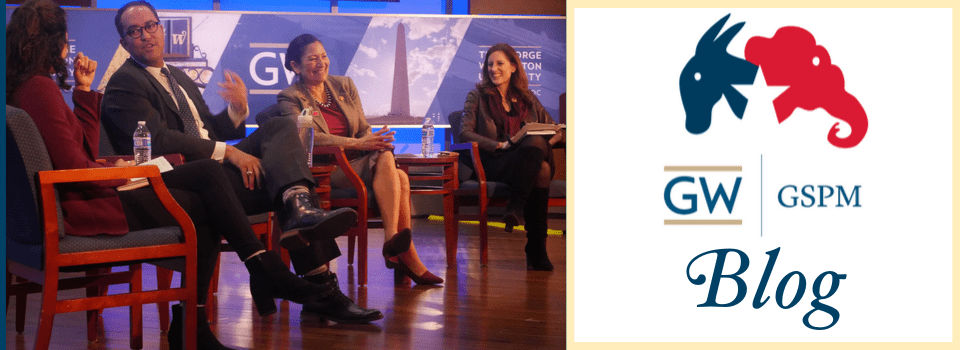The Graduate School of Political Management is proud to announce its newest fellows and Alumni Achievement Award winners.
Our fellows are leaders in politics and advocacy chosen by the school to serve 18 month terms contributing as adjunct professors, guest lecturers, panel speakers, and case study contributors. They serve an invaluable role in helping us give our students the best education in applied politics, communications, and advocacy. Previous fellows include U.S. Rep. John Shimkus, R-Ill., former U.S. Senator Kent Conrad, D-N.D., and Amy Walter, National Editor at the Cook Political Report.
Our current fellows:
Former House Majority Leader Eric Cantor, R-Va.: Cantor’s career in politics has stretched over two decades, serving in the United States House of Representatives and the Virginia House of Delegates. Cantor was a member of the House Republican leadership team for 11 years, starting as Chief Deputy Whip and ending as House Majority Leader after the historic 2010 midterm election cycle. Cantor currently serves as Vice Chair and Managing Director at Moelis & Company, a leading global independent investment bank.
Sarah Chamberlain: Chamberlain serves as the President and CEO of the Republican Main Street Partnership, which she helped to establish and grow into a thriving organization with more than seventy members of Congress as part of its network. A leading advocate for women in politics, Chamberlain established the Women2Women Conversations Tour in 2014 to spark dialogue between legislators and everyday citizens. Chamberlain is the only woman in the country who serves as the CEO of a major Republican organization. Prior to joining the partnership she served as the first Executive Director of the John Quincy Adams Society.
Former Senator Mary Landrieu (D-LA): Landrieu continued her family’s tradition of public service as a three-term United States Senator following terms as Louisiana State Treasurer and State Representative. Landrieu made history with her 1996 Senate election, becoming the first woman from Louisiana to serve a full term in the chamber. A strong advocate for her state, Sen. Landrieu played a key role in helping Louisiana recover from Hurricane Katrina and shepherded passage of the RESTORE Act, which was designed to help the Gulf Coast region recover from the Deepwater Horizon oil spill. Landrieu now serves as a Senior Policy Advisor at Van Ness Feldman.
Our Alumni Achievement Award winners represent the best of GSPM. They exemplify our values through their career accomplishments, contributions to their communities, GSPM, or GW.
Our 2017 Alumni Achievement Award winners:
Lindsey Schuh Cortés: Cortés is the CEO of BlueLabs, a data and analytics strategy consulting firm in Washington, DC. Prior to joining BlueLabs, she served as Director of Strategic Partnerships and Deputy Political Director at the Service Employees International Union (SEIU).
Barrett Karr: Karr serves as Chief of Staff for House Majority Leader Kevin McCarthy, R-Calif. In addition to other legislative roles, Karr has extensive executive branch experience as well working as the Deputy Assistant for Legislative Affairs for President George W. Bush.
Liz Reicherts: Reicherts is the head of U.S. Government Affairs at Siemens, leading its strategy on U.S. policy and international affairs and managing the U.S. Government Affairs team. Prior to Siemens, Reicherts enjoyed a 22-year career at BP, with a decade spent advocating for its international businesses.
We thank both our fellows and our award winners for their contributions to the school and we look forward to their continued involvement and counsel.


